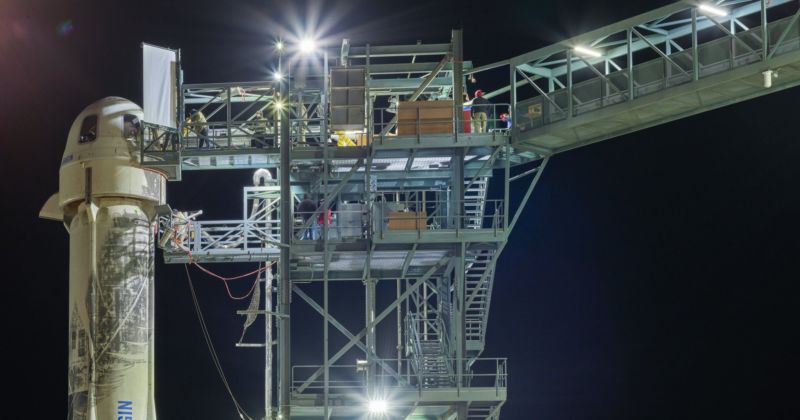https://arstechnica.com/?p=1445243

Blue Origin
Under clear West Texas skies on Wednesday morning, Blue Origin’s autonomous New Shepard launch system made what appeared to be a flawless flight into space and back. After separating from its booster, the spacecraft ascended to a height of 106.9km before returning to Earth by parachute. The booster also made a nominal powered landing.
For Blue Origin, the company’s first flight of its reusable New Shepard system in more than six months served a dual purpose. It provided additional test data for the launch system as the company moves closer to crewed flights, and the launch allowed the company to fly eight NASA-sponsored research and technology
into space through NASA’s Flight Opportunities program.
During the webcast, Blue Origin’s head of sales, Ariane Cornell, said the company was “aiming” to conduct human flights on board New Shepard before the end of 2019 but stressed that Blue Origin would not compromise on safety to meet any arbitrary dates. The company has yet to begin selling tickets for the six-person capsule or set a price for the 11-minute experience that will take passengers above the Kármán line and provide a few minutes of weightlessness.
Not a race
Unlike some previous test missions, Wednesday’s flight followed the same profile that space tourists will take. The vehicles flying Wednesday were the third New Shepard rocket that Blue Origin has built (Tail 3) and its second capsule. This was the fourth flight for both of the vehicles, which have been subjected to various tests, including an in-flight abort scenario last July.
Cornell said Tail 4, the fourth New Shepard booster, has already been shipped to the West Texas launch site from the company’s factory in Kent, Washington. It is undergoing tests there, and Blue Origin anticipates that Tail 4 will be the booster used to launch humans. The third capsule, also likely to be used for human missions, is undergoing work in Washington.
The company has stressed that it is not in a “race” with Virgin Galactic, which succeeded in flying above 80km in December for the first time with its air-launched piloted spaceship. Virgin Galactic has a list of more than 500 customers who have bought tickets and may begin flying some of those passengers later this year. Virgin says that 80km is high enough to be considered space, but during Wednesday’s webcast, Cornell noted that New Shepard would fly above 100km, “the internationally recognized line of space.”
via Ars Technica https://arstechnica.com
January 23, 2019 at 10:46AM
